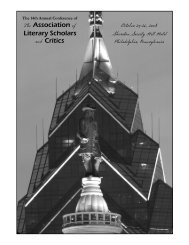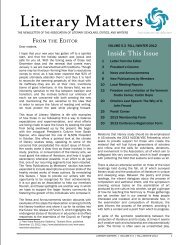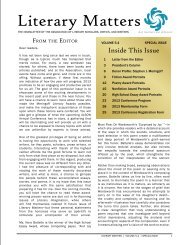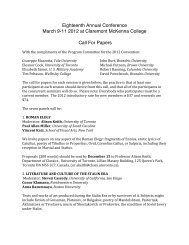Literary Matters - Association of Literary Scholars, Critics, and Writers
Literary Matters - Association of Literary Scholars, Critics, and Writers
Literary Matters - Association of Literary Scholars, Critics, and Writers
Create successful ePaper yourself
Turn your PDF publications into a flip-book with our unique Google optimized e-Paper software.
Local Meeting Boston: BasileOctober 22, 2010The New Engl<strong>and</strong> sect <strong>of</strong> the ALSCW gathered atBoston University’s Editorial Institute for its second localmeeting this fall on Wednesday, October 22 nd . Al Basile,accomplished musician <strong>and</strong> poet, set out to highlight thedisparities between the writing <strong>of</strong> poetry <strong>and</strong> the writing <strong>of</strong>lyrics. His presentation, “Words <strong>and</strong> Music, <strong>and</strong> the Music<strong>of</strong> Words: the Writing <strong>of</strong> Song Lyrics <strong>and</strong> Formal Poetry”was a definite nod to the recent inclusion <strong>of</strong> “W” in theorganization’s name, <strong>and</strong> touched upon the nebulousnature <strong>of</strong> writing that makes it such a gratifying challengeto those who create it <strong>and</strong> those who experience it.Basile began by transporting back to his childhood,sharing an anecdote about the strange satisfaction <strong>of</strong>reading the Burma-Shave billboards (which serve as atestament to the creative foundations advertising reliedon before the advent <strong>of</strong> pop-up ads <strong>and</strong> spam mail) ona drive down to Florida with his parents. The conceptwas poetic in a very literal sense: Burma-Shave put upbillboards at specific intervals, each <strong>of</strong> which had a fewwords or line <strong>of</strong> verse on it, that would ultimately forma short poem whose resolution was “Burma-Shave.”Though the laughter these jingles inspired was reasonenough to share them, Basile had another purpose inmind: in a certain sense, they encapsulate one <strong>of</strong> the keyconsiderations he posits as central to differentiating thelanguage <strong>of</strong> song from the language <strong>of</strong> verse.These billboards were measured out so that theywould be “timed” to allow passengers to read them beforereaching the next one given an assumed rate <strong>of</strong> travel,just as a songwriter must be sensitive to the music’sspeed in order to fit the language within the constraints<strong>of</strong> the tempo <strong>and</strong> rhythm. A song is, as Basile put it,“time-bound.” While a poet must consider the way theline breaks <strong>and</strong> how the words aredistributed in order to establish anappropriate pace <strong>and</strong> complimentform, the poem is, ultimately, ona page. Though a poem may takeon some musical qualities whendeclaimed, the timing <strong>of</strong> somethingexternal to it does not mitigate itsreception.This is a crucial boundary todraw, not only conceptually, butalso with regard to the process <strong>of</strong>writing, yet it is not as self-consciousan endeavor as it might seem atfirst glance. Basile notes that whileboth forms require the writer to“obey” certain sonic or structuralprinciples, this does not mean theundertaking is mechanical <strong>and</strong>calculated; he tends to intuitively know whether what heis writing is a poem or a song. Or, as he humbly put it: “Theones that want to be songs tell me what kind <strong>of</strong> song theywant to be.”Basile described what can only be seen as a veryintimate relationship existing between the writer <strong>and</strong>his creation, <strong>and</strong> while composing poetry may indeedcall upon different things from the writer than doespenning song lyrics, either production will take on thesame role in this partnership: to be conduits for theexchange <strong>of</strong> emotions from the writer to his audience.The method by which the emotional experience is madeinto something shareable may differ, just as the feelingsthat inspired the act <strong>and</strong> those it is intended to conveywill also vary. Basile revealed that, for him personally,whatever the feeling is that one gets from his poems orsongs, typically its antithesis inspired the work. However,whatever metamorphosis occurs, the ultimate goal <strong>of</strong> thisreformation is to transpose something that is felt intosomething that is.These insights into Basile’s process <strong>and</strong> hisphilosophical conception <strong>of</strong> the creative processrepresent just some <strong>of</strong> what those in attendance werefortunate enough to glean from the experience. To putone’s thoughts on the line takes courage, but to putone’s emotions on the line may take even more than that.Basile imparted not only the more scholarly <strong>and</strong> technicalaspects <strong>of</strong> his methods, but also the achievements <strong>of</strong>their practice; he shared two songs <strong>and</strong> two poems withthe group, <strong>and</strong> the audience was heartily appreciative <strong>of</strong>his c<strong>and</strong>or. When the presentation was over, a request foran encore <strong>of</strong> each song was made <strong>and</strong> granted, <strong>and</strong> withthat, the fall’s second Boston local meeting <strong>of</strong> the ALSCWcame to a close. a- Samantha MadwayALSCW Intern; Boston UniversityPhoto © Katherine A. HalaLITERARY MATTERS | VOLUME 3.4 | YEAR-END 2010 8







